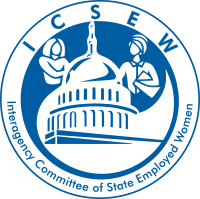2019 Transition Celebration Recap
Story and Photos by Tanyah Williams, Washington State Patrol
& Rachel Friederich ICSEW Communications Chair

ICSEW members listen to a tour guide inside the Legislative Building rotunda
More than 60 ICSEW members and guests attended the ICSEW’s annual Transition Ceremony & Celebration at the Washington State Legislative Building in Olympia July 16.
The ICSEW welcomed 31 people who had become representatives or alternate members for their state agencies over the past fiscal year. The ICSEW also recognized 20 representatives and alternate representatives who had completed their service.
It also included two professional development trainings and an update from Rep. Doglio about new legislation impacting women and families that went into effect July 1 and work of the Washington State Women’s Commission. The commission works to improve the well-being of all women in the state of Washington. It has up of nine voting members and four seats held by legislators who serve as non-voting advisory members. Doglio holds one of the legislative member seats.
Renee Smith

Renee Smith talks about making work more human
Renee Smith, Director of the Workplace Transformation at the Results Washington, Office of the Governor, spoke on Human Work: Leading and Teaming in an Era of Empathy.
Smith says the best, most productive teams, are ones that make workplaces more human though loving gestures. But historically, workers have been trained to work in environments that are the opposite of love: fear.
Smith did research on this phenomenon by collecting “fear” and “love” themed stories form employees about how they were treated by leaders. She said in fear environments, people:
- Do not know how to be successful after change
- Betrayed
- Humiliated
- Isolated during personal crisis
- Uncomfortable during personal crisis
By contrast, in love-centered environments, employees said they:
- Leaders cared about them
- Had a healthy team/family
- Felt supported in a personal crisis
So how do we make work more human?
Smith offered these tips:
- Be there for each other
- No more “Mean Girls” (raise each other up and don’t gossip about each other)
- Question assumptions
- Question ideal-era norms
She concluded her presentation with these words of wisdom:
- When people are comfortable, they perform better.
- Take off your mask. They hide our real beauty. They prevent us from connecting authentically.
- Align words and actions.
- Bring our whole selves and welcome others to bring theirs.
- Transform workplaces with love and empathy.”
Beth Doglio

Rep. Beth Doglio gives an update about the Women’s Commission
Doglio, who represents the state’s 22nd legislative district, said the commission identified 15 priority bills in the 2019 legislative session, 11 of which passed. Doglio talked about a few of the bills enatacted into law at the Transition Celebration including:
- HB 1303, which removes certain restrictions on subsidized health care for students at higher education institutions
- HB 1713, which improves law enforcement response to mission and murdered Native American Women
- HB 1166, which provides funding to eliminate a backlog of more than 10,000 untested rape kits
- HB 1696,legislation designed to reduce the gender wage gap which prevents private employers from asking perspective candidates about their past wage histories
- SB 5258, which would require companies that employ people who work in isolated environments (such as hostel housekeepers, janitors and security guards) to provide electronic panic buttons and sexual harassment prevention training
Linda Tilson

Linda Tilson talks about the ins and outs of networking
All attendees participated in a ‘lunch and learn’ session “Networking from a Place of Giving,” with Linda Tilson. Tilson is the co-founder of Coaching Hub. Coaching Hub is a coaching platform that connects clients, coaches and people that support coaches together in order to accomplish their mission and vision.
Participants learned how to network using “appreciative inquiry.” Tilson says the concept of this form of networking is to “train your brain to actively listen.”
She says when most people go to a networking session, they’re taught the “30-second elevator pitch,” which is often rehearsed and scripted with key points you want to say. But when you use appreciative inquiry, your mission is to listen to what a person is saying to find out what’s important to them.
“You lead with love, and logic comes second,” Tilson said.
For the exercise, participants paired up with a partner to respond to the question “If you could do more of something, what would it be?” The person who was listening was supposed to ask follow-up questions to their partner to learn about the other person’s passions. At the end of the exercise, each participant had to introduce their partner and talk about something they learned about the person.
Tilson said by using “appreciative inquiry” in networking, it sets you up for more organic conversations and gives you more opportunities to share information freely and openly.
Meeting Minutes, along with the annual report and Transition Celebration program can be found here.

